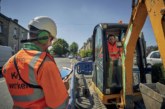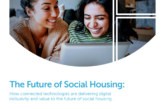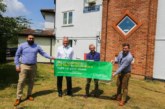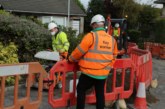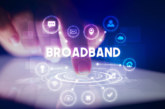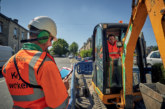Hyperoptic speaks to LABM about the importance of breaking digital exclusion and why both education and connectivity matters.
It is a shocking statistic that some 11.3 million adults in the UK are digitally excluded and 37% of these people live in social housing. To be ‘cut off’ from the Internet in 2019 brings with it numerous disadvantages and inevitably means that people miss out on the best energy tariffs, the cheapest shopping prices as well as making it more difficult to find jobs and learn new skills.
We all have a role to play in ending this and this begins with Internet service providers such as Hyperoptic. In June we launched our first Digital Skills Academy for local people in Southwark. The initiative will enable 50 volunteer champions to be given free training and support to help develop the digital skills of other residents in the borough — many of which are social housing tenants. The volunteers are typically residents looking to upskill, or students who will gain valuable CV enhancing skills. They will attend an introductory session delivered by training specialists We are Digital and be provided with ongoing training and support through Digital Unite’s Digital Champions Network.
The Network is an award-winning learning platform that provides accredited online training, hundreds of ready-to use teaching resources, a peer community and project management tools. Once they have completed their training, the Hyperoptic Digital Skills Champions will then share their skills in workshops they set up in the local community.
Libraries are key
Libraries are at the heart of the initiative which is why we are providing free full fibre broadband connections to six libraries in Southwark where some of the training will take place (Canada Water, Peckham, Dulwich, Camberwell, Grove Vale, Kingswood, New Walworth). The next part of the programme will see us working with these libraries to identify 10 residents who use Southwark Council’s free home library service and provide them with six hours of in-home training from We are Digital. The in-home training will be for residents with disabilities, older people, carers or those who cannot visit a library.
Feedback has been positive with Councillor Stephanie Cryan, Cabinet Member for Jobs, Business and Innovation stating that: “We are delighted Hyperoptic is launching this initiative. The role of the champions is set to be incredibly valuable for the community as well as immensely rewarding for those involved. We want to make sure that all residents benefit from opportunities to take advantage of the digital revolution and this initiative helps to provide that opportunity.”
Addressing the connectivity issue
We see our work with Southwark as just the beginning of working with local authorities on skills projects to help break the digital divide. But of course, skills are only one part of the equation, the other is connectivity. Whilst libraries are a great place to learn and network face to face with others, people want a decent internet connection at home along with the convenience and lifestyle improvement that brings.
Southwark Council is a template in many ways and on the connectivity side we have entered into an agreement with it to enable 100,000 homes and businesses in the borough to have access to gigabit full fibre broadband, at no cost to the taxpayer. To do this we are investing in connecting the whole of Southwark Council’s housing portfolio, including 53,000 residential homes and nearly 1,000 commercial properties with full fibre to the premises.
Just two years ago consumer champion Which? Named the London borough of Southwark as one of the 20 worst places in the UK for broadband speeds — averaging 10.4Mbps. Now Southwark is connected to the fastest UK broadband available. Hyperoptic achieves these speeds through installing fibre all the way to the building rather than relying on old copper wiring which was designed over 140 years ago to carry much smaller volumes of data at a time before connected or steaming devices. The key to this turnaround is recognising the power of partnership — namely those between broadband providers, local authorities and housing associations.
Lack of finance is not the issue
There is a widely held myth that the largest barrier to installing lightning-fast new fibre is lack of finance. It isn’t, rather the biggest challenge is getting the necessary permissions to install fibre services. Normally this takes the form of a ‘wayleave’ — the right of way granted by the landowner to give access to the property. Hyperoptic is seeking to streamline this process through new ‘block’ agreements. These ‘game changing’ agreements see council-owned properties supplied with full fibre and at the same time privately owned properties are given access to it. Residents are typically offered a range of packages ranging from 30Mbps to 1Gbps, often with a more basic service specifically tailored to social housing tenants.
As well as Southwark, a similar agreement has been reached with Brent Council and together these will see over 200,000 London homes connected under one agreement. Hyperoptic is currently engaged up and down the country on further partnerships that will bring the promise of full fibre to the masses and provide property managers with services that truly delight their tenants.
Housing associations work closely with local authorities and are key to this mix also. To take another example with Network Homes, an award-winning HA with over 40 years’ experience of providing affordable housing. It has signed its full portfolio of 20,000 units to Hyperoptic which will supply new fibre connections direct to the homes. Customers will have a choice of a range of packages with speeds up to 1Gbps (1,000 megabits per second), which is over 18x faster than the UK average.
Being a ‘partner’ rather than a supplier is crucial and it is these unique partnerships which are enabling digital inclusion and bringing hyperfast broadband to a broad spectrum of demographics and property types.


